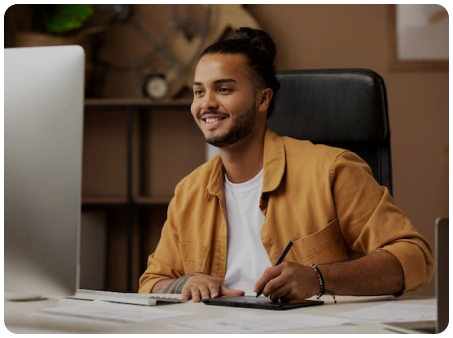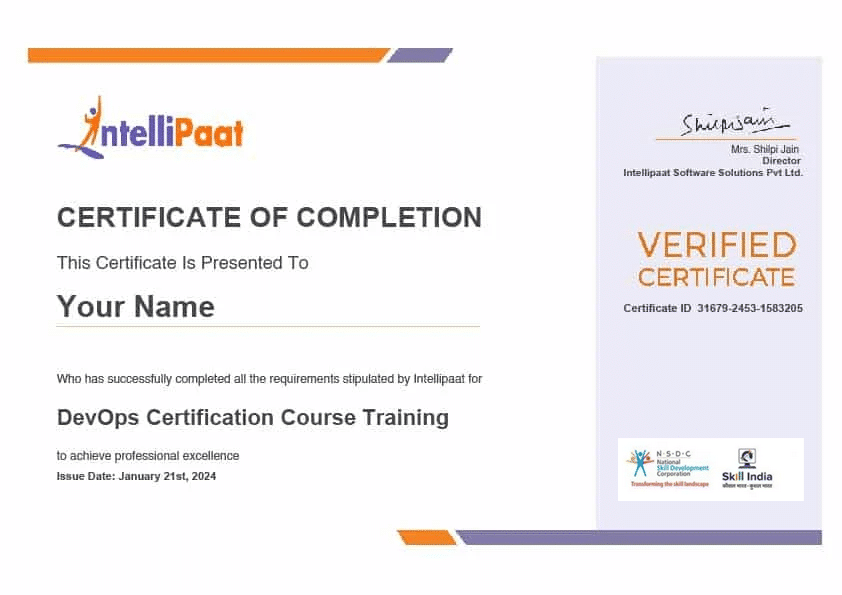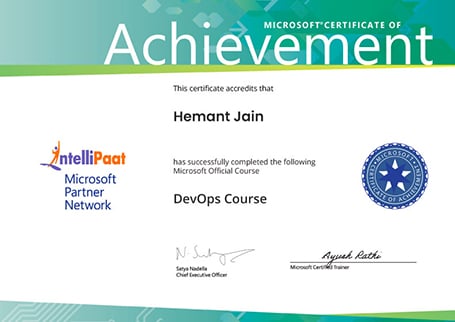Your cart is currently empty.
- Placement Assistance
- Exclusive access to Intellipaat Job portal
- Mock Interview Preparation
- 1 on 1 Career Mentoring Sessions
- Career Oriented Sessions
- Resume & LinkedIn Profile Building

60% Average Salary Hike
$1,08,000 Highest Salary
10,000+ Career Transitions
3100+ Hiring Partners
Career Transition Handbook
This course offered in collaboration with Microsoft, includes live online instructor-led classes. Participants will work on multiple projects and real-world case studies to gain the skills of a DevOps Engineer. You will also learn the latest Generative AI tools, along with DevSecOps practices along their application in this course to stay ahead in the software industry.
On successful completion of the modules in this course, learners will obtain a DevOps Certification. This DevOps Certification will ensure that the learners are industry-ready from Day 1.

3 Hours By Industry Experts
Preview3 Hours By Industry Experts
3 Hours By Industry Experts
Preview3 Hours By Industry Experts
3 Hours By Industry Experts
3 Hours By Industry Experts
Preview3 Hours By Industry Experts
3 Hours By Industry Experts
3 Hours By Industry Experts
3 Hours By Industry Experts
3 Hours By Industry Experts
3 Hours By Industry Experts
3 Hours By Industry Experts
3 Hours By Industry Experts
3 Hours By Industry Experts
3 Hours By Industry Experts
3 Hours By Industry Experts
3 Hours By Industry Experts
DevOps Methodology
Continuous Integration
Continuous Delivery
Control Deployment
DevSecOps
Version Control Systems
DevOps Serverless
Architecture Infrastructure Provisioning
Microservices Configuration
Management Logging
Kubernetes for Continuous Orchestration
ELK for Continuous Monitoring
Terraform and Workspaces
Puppet and Ansible for Configuration Management
Selenium for Continuous Testing
Docker for Containerization
AWS DevOps
Maven
Generative AI in DevOps
Advanced CICD using GitLab
Software Composition Analysis
SAST
DAST
Kubernetes Security
Service Mesh
GitOps
Devops Projects
This certification program caters to working professionals across industries. The learner diversity adds richness to class discussions and interactions.
To take the admission in this course, a simple 3-step process is to be followed. Only the candidates who will be shortlisted through this process can get admitted to the program.
DevOps combines IT operations with development to improve software delivery. It offers better team integration and faster delivery by automating the workflows that reduce delays and errors.
The most important role of a DevOps Engineer is to work as a bridge between the development team and the operations team. The main job of a DevOps engineer is to manage CI/CD pipelines and automate processes so that deliveries can be seamless and we can rely on infrastructure stability.
DevOps has various components, but some key components are Continuous Integration, Continuous Delivery, Automated Infrastructure, monitoring and collaboration between development and operations teams, and configuration management.
DevOps works as a bridge between the software development and operations teams by streamlining the software lifecycle, improving the quality of deliverables, and resolving issues efficiently.
Yes, DevOps is a promising career choice because its demand is increasing daily. Businesses nowadays want to automate processes to ensure smooth software delivery.
Yes, even freshers can secure a job as a DevOps Engineer if they learn some basic tools like Git, Docker, and Jenkins, along with some skills like automation and real-world problem-solving.
After completing this course with Intellipaat, you will have various job opportunities, such as a DevOps Engineer, Automation Specialist, Cloud Engineer, Release Manager, and many more.
The responsibilities of a DevOps Engineer are to work as a bridge between the development and operations teams. A DevOps engineer manages CI/CD pipelines and automates processes to ensure efficient delivery.
To become a DevOps Engineer, you should learn some basic tools like Git, Jenkins and Docker. You can join this course by Intellipaat, where you will build your skills on these tools and get experience on real-world problems.
No, it is not mandatory to have a background in programming as, in this course, coding is not required. However, if you have basic knowledge of Python, then it will be helpful in building experience.
Yes, you non IT professional can learn DevOps. This course will help you learn all the required skills and tools to guide you towards a DevOps professional. We will begin by learning basic tools and then move on to advanced concepts.
In this course, you will learn about Git, Jenkins, Docker, Kubernetes, Ansible and many more tools that will build your skills in version control, CI/CD, infrastructure management, configuration, etc. This course will also help you learn about some monitoring tools and cloud platforms like Azure or AWS.
Yes, you will start working with DevOps tools like Git, Jenkins, Docker, etc., in 4 months and with continuous practice and focused learning, you will be able to solve real-world problems. However, you must continue learning and practising advanced concepts after this course.
In this course, we will focus on automation tools and managing workflows, but we’ll also use AI tools like ChatGPT to analyze logs and automate scripts.
To become a DevOps Engineer, you must learn some business skills like collaboration, real-world problem-solving, project management, etc. With these skills, you will learn how to align technical goals with organizational objectives.
These classes are scheduled for weekdays, weekends, and evening batches to provide flexibility to working professionals and students so that they can manage their time efficiently. Specific dates and timings for batches are listed above.
If you miss a class, you can go through the topic in the recorded sessions and also from the course material that will be provided to you. Intellipaat also allows you to attend the missed class in future batches so that you can cover the concept later.
Yes, Intellipaat offers lifetime access to course materials and class recordings, so that you can revisit the concepts even after the course completion.
DevOps is in high demand, with businesses prioritising automation and seamless software delivery. Completing this course will provide job opportunities for people like DevOps Engineer, Site Reliability Engineer, Automation Specialist, Release Manager, etc.
Our placement services include resume-building, career counselling, alumni networking, and mock interviews. We also market resume of our learners to our 3100+ hiring partners which includes top MNC’s and startups and schedule interviews with them .
Intellipaat ensures you’re well-equipped with skills and certifications and connects you with hiring partners, but it doesn’t guarantee a DevOps Engineer job. Their placement assistance team helps you build your resume and provides the resources required to secure jobs in the DevOps domain.
Intellipaat allows students to interact and collaborate with fellow learners through live sessions, group discussions, and workshops. Also, there will be forums and community groups where you can share your ideas, seek guidance, and collaborate on assignments and real-world projects.
You will be provided ongoing support during and after the course completion. You will be provided with lifetime access to course materials and recorded lectures, which you can access to stay updated on your concepts.
We will help learners to install tools that are required practice tools like Docker, Jenkins, and Kubernetes to enhance your DevOps skills. These labs will help you gain real-world experience with DevOps practices.
Yes, after completing this program, you can pursue some official certifications like AWS Certified DevOps Engineer, Kubernetes Certified Associate, Docker Certified Associate, and many other certifications. This will help in validating your expertise on specific tools and platforms.
After enrolling in this DevOps course by Intellipaat, you must complete all course modules, finish all real-world projects and submit assignments. This certificate will be awarded after you meet all the course requirements and demonstrate your practical DevOps domain knowledge.
A DevOps certificate provided by Intellipaat will hold significant value in the IT industry as it is widely recognized by industries and hiring partners of top companies. This certificate will showcase your expertise in the DevOps fields like automation, CI/CD, infrastructure management and cloud technologies. It will enhance your resume and make you a competitive candidate for job roles like DevOps Engineer, Cloud Architect, Release Manager, etc.


